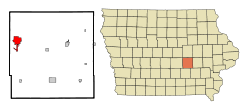Grinnell, Iowa
| Grinnell, Iowa | |
|---|---|
| City | |

Downtown Grinnell
|
|
| Motto: "Jewel of the Prairie" | |
 Location of Grinnell, Iowa |
|
| Location in the United States | |
| Coordinates: 41°44′37″N 92°43′29″W / 41.74361°N 92.72472°WCoordinates: 41°44′37″N 92°43′29″W / 41.74361°N 92.72472°W | |
| Country |
|
| State |
|
| County | Poweshiek |
| Area | |
| • Total | 5.64 sq mi (14.61 km2) |
| • Land | 5.60 sq mi (14.50 km2) |
| • Water | 0.04 sq mi (0.10 km2) |
| Elevation | 1,014 ft (309 m) |
| Population (2010) | |
| • Total | 9,218 |
| • Estimate (2012) | 9,118 |
| • Density | 1,646.1/sq mi (635.6/km2) |
| Time zone | Central (CST) (UTC-6) |
| • Summer (DST) | CDT (UTC-5) |
| ZIP codes | 50112, 50177 |
| Area code(s) | 641 |
| FIPS code | 19-33105 |
| GNIS feature ID | 0457150 |
| Website | City of Grinnell, Iowa |
Grinnell is a city in Poweshiek County, Iowa, United States. The population was 9,218 at the 2010 census.
Grinnell was founded as a "Yankee" settlement, that is to say it was founded and originally settled by settlers from New England (as well as those from upstate New York whose parents and grandparents had come to that region from New England) who were descended from the English Puritans who settled New England in the 1600s. Grinnell was founded in 1854 by Josiah B. Grinnell a Congregationalist from Vermont. The city was originally slated to be named "Stella," but J.B. Grinnell convinced other members of the colony to adopt his own name for the city, citing it as a rare and concise name. Grinnell was incorporated on April 28, 1865, and by 1880 Grinnell had a population of around 2000. Located at the junction of two railway lines (east-west line of the Rock Island Railroad and the north-south Minneapolis and St. Louis Railway), it became and remains the largest community in Poweshiek County.
Grinnell was a stop on the Underground Railroad. One of the most famous events occurred in February 1859, when John Brown, a strong abolitionist, and 12 slaves he was helping escape to freedom, were hosted by J.B. Grinnell and several other community residents. Because of J.B.'s efforts to help slaves and end slavery, in 2013 the National Park Service included his gravesite at Hazelwood Cemetery on the National Underground Railroad Network to Freedom listings.
Grinnell was also a stop along the (Mormon) Pioneer Trail, which spans across five states covering about 1,300 miles. The trail was traveled by an estimated 100,000 plus travelers from 1846 to 1869, including some 70,000 Mormons escaping religious persecution. The Pioneer Company of 1846-1847 established the first route; from Nauvoo, Illinois to Salt Lake City, Utah. Today, the Pioneer Trail is still visible through many parts of rural Grinnell.
Grinnell is home to Grinnell College, established in 1846. In 1889, Grinnell College and the University of Iowa played each other at Grinnell College in the first football game played west of the Mississippi River. On June 17, 1882, a tornado destroyed most of the college campus and much of the community with a death toll of 68. In 1889 fire destroyed most of the downtown area. Grinnell College is nationally recognized as a leading undergraduate institution. In July 2006, The New York Times included Grinnell in its profile of the 20 colleges and universities of "established or rising scholarship" which are fast becoming viable alternatives to Ivy League institutions, and is considered one of the 30 Hidden Ivies.
...
Wikipedia

